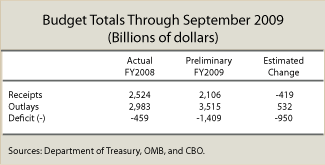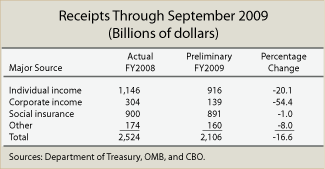The voices of Tax Policy Center's researchers and staff

 Last week the Congressional Budget Office quietly released its October Monthly Budget Review showing preliminary 2009 budget numbers. The $1.4 trillion deficit more than tripled the previous record of $459 billion set just last year (see top table). More than half of the increase was due to a $530 billion jump in outlays but 44 percent came from a 17 percent drop in revenues. That decline resulted in the federal government collecting a smaller share of taxes than at any time in the last half century.
Last week the Congressional Budget Office quietly released its October Monthly Budget Review showing preliminary 2009 budget numbers. The $1.4 trillion deficit more than tripled the previous record of $459 billion set just last year (see top table). More than half of the increase was due to a $530 billion jump in outlays but 44 percent came from a 17 percent drop in revenues. That decline resulted in the federal government collecting a smaller share of taxes than at any time in the last half century.
A bit of the $420 billion decline came from tax cuts in the stimulus bill but six out of seven lost dollars were due to the recession. CBO estimated that the 2009 stimulus reduced revenues by $61 billion in 2009, almost the same as the $62 billion revenue loss from the 2008 tax rebates.
THE stimulus bill mostly cut individual income taxes. The Making Work Pay credit reduced wage withholding starting in April. The new homebuyer’s credit gave up to $8,000 to people claiming it on their 2008 returns. Most of the other cuts modified existing tax credits—the earned income tax credit, the child credit, and the education credit—and the bulk of their impact won’t come until beneficiaries file their 2009 tax returns next April. All told, the stimulus cuts accounted for only a little more than a quarter of the 20-percent drop in income tax revenue—$230 billion (see bottom table).
 Corporate income tax revenues took the biggest hit, down by more than half from 2008. The deep recession wreaked havoc on corporate profits, leaving a large majority of firms with no tax liability. The consequent $165 billion drop in corporate taxes accounted for nearly 40 percent of the total revenue decline.
Corporate income tax revenues took the biggest hit, down by more than half from 2008. The deep recession wreaked havoc on corporate profits, leaving a large majority of firms with no tax liability. The consequent $165 billion drop in corporate taxes accounted for nearly 40 percent of the total revenue decline.
Social insurance and other federal taxes suffered smaller hits—only about 2 percent, less than $25 billion in total.
Total federal revenue in 2009 amounted to just 14.9 percent of GDP, the smallest fraction since 1950 and far below the 26 percent of GDP spent by the federal government. That gap will narrow in coming years but CBO projects that it will average more than 4 percent of GDP over the next decade, and that’s only if the 2001-2006 tax cuts expire in 2011 as scheduled. Extending those cuts, even only for President Obama’s broad middle class, will mean deficits as far as the eye can see.
Posts and comments are solely the opinion of the author and not that of the Tax Policy Center, Urban Institute, or Brookings Institution.
